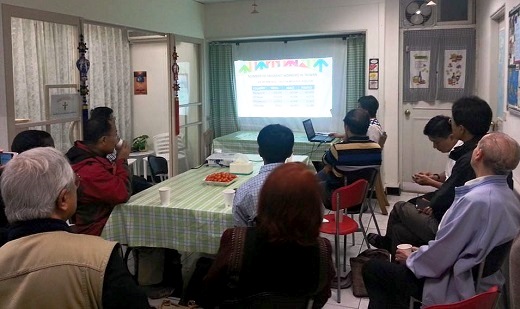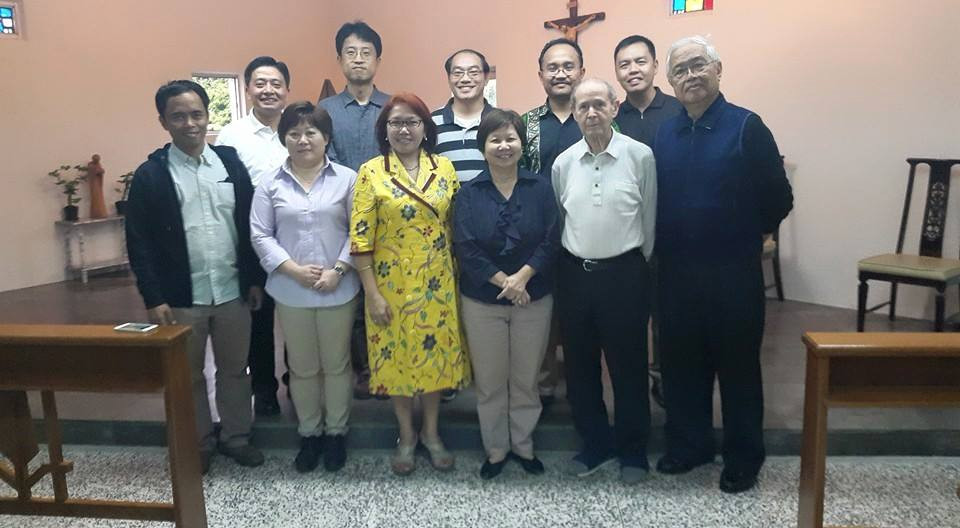Visitors to Taiwan are greeted at the Taipei airport by signs welcoming migrant workers to the island country. The authorities provide a lot of information to migrant workers, on their rights as well as precaution measures in place, upon their arrival to the country, even before they meet their agencies or employers. In a country with 23 million people, the presence of more than half a million migrant workers is no small figure.
It was in this setting and context that this year’s Jesuit Conference of Asia Pacific Migration Network meeting was held from April 21 to 23.
The inaugural meeting in Jakarta last year had resulted in an action plan, and the group had gathered to see if it had actually worked and what lessons could be learnt from the first year of collaboration. There was clearly a stronger sense of purpose and eagerness.
The network’s five participating institutions were represented by their directors, old and new. At Yiutsari in Korea, Fr Kim Tae-jin SJ had taken over from Fr Kim Chong-dae SJ who had left the post to do tertianship in Australia. Fr Archie Carampatan SJ had succeeded Fr Nilo Tanalega SJ as the executive director of UGAT Foundation in the Phillippines. Fr Ando Isamu SJ of Tokyo Migrants’ Desk was accompanied by his secretary Ms Jessie Tayama, while Fr Ismartono SJ of Sahabat Insan in Indonesia came with Ms Astuti Sitanggang, a legal officer of the organisation. Sr Wei Wei and Ms Jennie Lee represented the Rerum Novarum Center in Taiwan.
Also in the meeting were Fr Joseph Dao Nguyen Vu SJ, a Jesuit from the California Province who has just been appointed executive secretary of the Vietnamese Episcopal Commission for the Pastoral Care of Migrants and Itinerant People; Fr Bambang Sipayung SJ, regional director of Jesuit Refugee Service Asia Pacific; and three young Jesuits residing in Taiwan who came as observers: Joseph Bui Ngoc Thang SJ, Jean Amegble Yao Kékéli SJ, and Joseph Nguyen Bao An SJ.

The group agreed that communication had been the most challenging action in the plan. Collaborating across the boundaries of Asia Pacific may look doable on paper during this Internet age, but virtual communication has its limitations. People have different attitudes toward the Internet and much was lost in the process of trying to get connected, at least in the early stages. Face-to-face interaction remains the most productive means of communication.
Another point raised was the capacity of the institutions to implement programmes. Most of them are small in terms of personnel and budget, and they can only do so much with the resources they have to hand. Being part of the network means more work that can be easily overlooked given their tight schedule.
A major challenge arises with leadership changes, which shows a lack of institutional capacity that stands in contrast to the designation of migration as a common apostolic priority of this Jesuit Conference. Serious investments in all departments are needed to make this priority more meaningful.
And an activity that made the meeting more meaningful was the visit to Rerum Novarum shelter in Taipei. Shielded from prying eyes, the small two storey building nestled unnoticed between the surrounding tall office blocks. There eight women migrant workers from Indonesia and the Philippines had taken refuge after experiencing abuse, mistreatment, non-payment of wages, and contract termination. Rerum Novarum runs the shelter like a home for these unfortunate women, making them feel safe and welcome despite the hardship.
The group also visited St Christopher’s Church in the city centre which doubles as the Diocese Migrant Workers’ Concern Desk. Fr Leonilo Mantilla, a Scalabrinian from the Philippines, welcomed everyone with stories of how the church has become a symbol of hospitality for migrants in the city.


